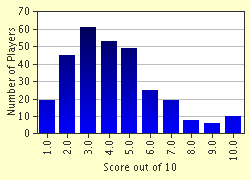Quiz Answer Key and Fun Facts
1. What was a pomegranate originally, for those who coined the word?
2. Which of these herbs got its name because people considered that it smelled a bit like new-mown hay?
3. What did it originally mean to 'eat humble pie'?
4. Why is Pentecost also called Whitsunday?
5. How did the chameleon get its name?
6. What was a Yeoman of the Guard originally?
7. Which of these words does NOT derive from the Latin root procurator, or procuratio ?
8. What was a neighbour originally?
9. What does ombudsman literally mean?
10. Which of these proper names literally means horse-lover?
Source: Author
flem-ish
This quiz was reviewed by FunTrivia editor
looney_tunes before going online.
Any errors found in FunTrivia content are routinely corrected through our feedback system.

